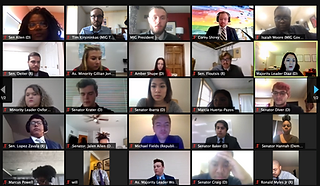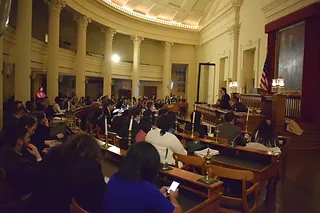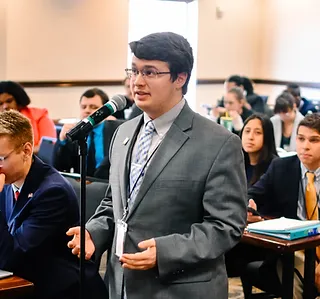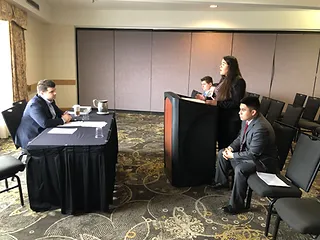Trending
- May 5, 2025
Friday Recaps As Floor Sessions Steam Ahead


As I caught up with Senator Diana Ibarra (D) after a hectic day of zoom meetings, I had the opportunity to learn more about what it’s like to be a passionate debater in the MIG simulation. Even though this way of debating is new for everyone this year, including those with the most experience there was a lot of preparation that went on before the cameras and microphones were set up.
Senator Ibarra is a UIS delegate and has been part of MIG for three years now and is currently double-majoring in Political Science and Legal Studies. I wanted to know more about what interested her in becoming part of MIG and she went on to explain how her interest in becoming part of MIG comes from the passion she has for politics and for making sure that her opinions for the well-being of others are heard. In her debates today I saw that passion and willingness to communicate with the utmost respect for her colleagues, even with the opposing side whose arguments were just as passionate as hers.
Her stances on proposed bills are very progressive and I questioned, “Do you think your stance on topics are geared more to the well-being of the people versus the economic importance that the opposing side prioritizes?”
“I try to empathize with people and try to put myself in their shoes,” she said.
That is exactly what she did, putting herself in the position of others, for example, the women in prisons who are in dire need of menstrual pads and contraceptives and speaking on their behalf.
by: Tamas DiLorenzo
HOUSE COMMITTEE 2, HB 2842:

Joseph Partain in 2020 – Model Illinois Government Archive
Democrats sought bipartisan support for a bill that would make it illegal for colleges to inquire about criminal history among applicants, and any criminal history uncovered incidentally would have to be disregarded by the administration of the college. Democrats argued that a college education was a right and that applicants should not be discriminated against due to decisions made in their past. Republicans argued that allowing criminals onto campuses would only lead to a rise in on-campus crimes, and that it should be up to colleges what kind of criminal offenses they are comfortable with seeing in their student population.
Minority Spokesperson Lemon (R-Southeastern Illinois University) argued that campus crime including rape, already too prevalent in Illinois colleges, would rise as a result of the bill. Assistant Majority McLeod (D-Southeastern Illinois University) countered that there was no evidence that rapes committed on campuses today were being committed by students with criminal histories.
Minority Representative Schutt (R-Southeastern Illinois University) argued that criminal history is a matter of public record, so it should be admissible in the already competitive college admissions process. His constituents followed this line of reasoning by asking why schools could selectively choose students based on qualities like race or gender to change their demographics, but could not choose students based on the previous criminal actions of those students.
Democrats focused on the idea of self-improvement. Their main stance was that people who had committed crimes deserved a chance to improve themselves through education. This bill will, in democrats eyes, enable new opportunities for students who have previously committed crimes and want to reintegrate into society. Democrats concluded by pointing out that Illinois was third in the Union for wrongful conviction, and that this bill would adversely affect those who have already been failed by the justice system.
HB 2842 was passed 7/6.
Moot Court Turns Up the Heat by: Elijah England

Previous Moot Court – Model Illinois Government Archive
Karl Webb came in hot during the later parts of the second round in moot court. Webb explained to the court why his client feels the need to act. Webb states that, “Nothing has been done so he went to Facebook to address the Sheriff’s department.” The judge questioned this statement by asking, “Doesn’t the government’s special interest outweigh his speech?” To which Webb responded, “The words he used were from pure motivation for these injustices in hopes of resolution for his community.” The debates over Facebook communication issues between the Sheriff’s department and members of the public were passionate to say the least. Jasmine Flowers, who was representing the Sheriff’s department in this round, stated, “Wouldn’t an individual with good motives not use the term ‘fight’? Because the use of profanity suggests the use of physical means to get change.” Moving on into round three brought out even more heat when Raven White, who was representing the defendant in this round, stated that, “No policy saying this is a private forum.” What is gathered from this round is that there should have been a statement or “warning” provided to prove this was a “private forum” that would remove comments that did not follow their “private forum” rules. Reena Riley states that removing this comment without removing other comments is, “viewpoint discrimination”. Riley also stated that, “They should have stated that critics should be sent privately.” These rounds have expanded and analyzed the facts of this case and the final rounds later in the weekend should be quite fascinating.
© 2023, www.modelilgov.org/. All rights reserved/HOME/privacy-policy/ sitemap